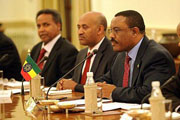
Ethiopian Deputy Prime Minister and Minister of Foreign Affairs Hailemariam Desalegn, right (file photo)
|
 Ethiopia Declines to Respond to US Rights Charges
Ethiopia Declines to Respond to US Rights Charges
Ethiopia has ended its practice of formally responding to the annual U.S. human rights report, as it has done the past two years. A statement said the government views the Congressionally-mandated report with contempt, and has no plans to answer the charges.
The most recent State Department report paints a troubling picture of human rights conditions in Ethiopia.
It depicts a state with a widespread system of paid informants reporting on people’s activities, where criminal courts are subject to significant political intervention and influence, and where non-governmental organizations say hundreds of political prisoners are being held.
The 56-page report documents restrictions on academic and press freedoms, including intimidation and detention of journalists, jamming foreign broadcasts, blocking internet websites, and prohibiting political activity on college campuses.
It also implicitly questions the existence of a multi-party democracy, noting that the ruling party and its affiliates won almost every one of 3.4 million local council seats in 2008 elections and all but two seats in parliament in 2010.
The report quotes what it calls multiple credible sources saying party membership is an important factor in obtaining university admissions, employment opportunities, food aid and other benefits controlled by the government.
Additionally, it notes that a new law regulating non-governmental organizations has sidelined two prominent domestic human rights defender groups, including the only one doing actual investigations and reporting on alleged abuses.
Ethiopia’s reaction to the report, which covered abuses reported in 2010, was furious. A foreign ministry statement charged that 80% of the material was a rehash of groundless and unverifiable allegations from dubious sources contained in previous reports. It said the rest was mostly a few new lies, added to the old ones, and questioned whether the U.S. government’s motive was simply to tarnish Ethiopia’s image.
Deputy Prime Minister and Foreign Minister Hailemariam Dessalegn dismissed the document as a meaningless “cut and paste” exercise.
"We said this is a methodology failure. So if the United States is worried about the human rights challenge, then it should be critically evaluated. So if it is ‘cut and paste,’ then it doesn’t give any meaning to anyone. So we said, if it continues like this, it has nothing to do with changing and improving the human rights situation in Ethiopia."
In response to the two previous State Department reports, in 2008 and 2009, Ethiopia published a rebuttal challenging the accuracy of the charges. Prime Minister Meles Zenawi called the pamphlets a sign Ethiopia takes the U.S. criticisms seriously, unlike reports from groups such as Human Rights Watch, which the government categorically dismisses.
But Foreign Minister Hailemariam says the latest U.S. report does not merit a response, and would be treated with what was called "the contempt it deserves."
"The last two years we have engaged ourselves with the authorities of the United States and discussed several meetings on the human rights situation in Ethiopia. We thought we had convinced each other on many of the issues… If this is not considered at all, then there is no need to accept this report as something that can help us. So that’s why we dismissed the report totally because it is based on unfounded allegations which are baseless."
Hailemariam made clear, however, that the report would not affect what he called the "cordial relationship" between Addis Ababa and Washington. He said, "we dismiss the report, we have not dismissed the United States."
Ethiopia remains an important U.S. partner in the volatile Horn of Africa region. The United States is Ethiopia’s largest bilateral aid donor, with assistance totaling roughly $1 billion a year.
(2011-4-24/voanews.com)
|





